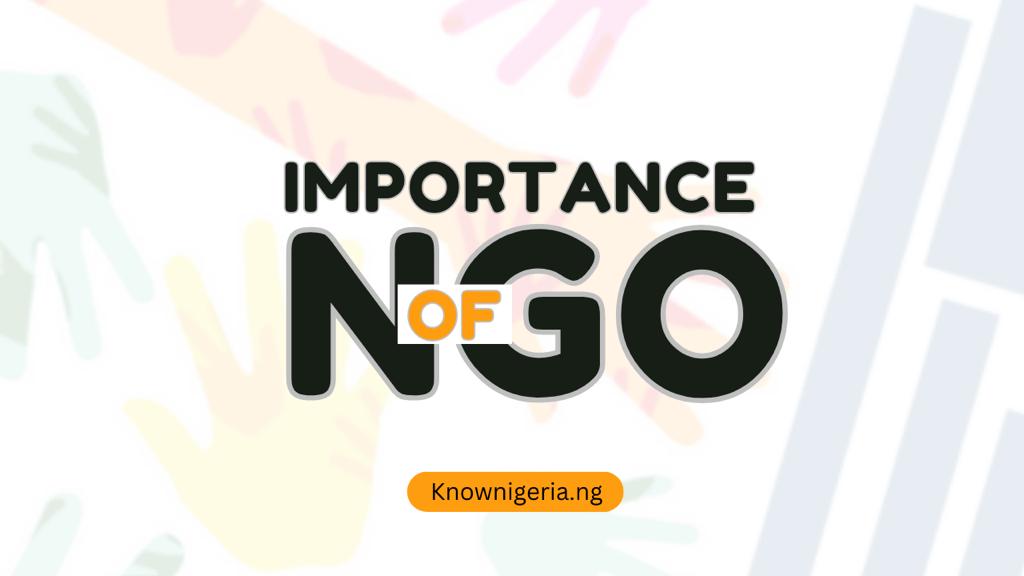NGOs are Non-Governmental Organizations. NGOs are nonprofit, voluntary organizations operating locally, nationally, or worldwide. It was generally created to engage in nonprofit activities, meaning they are not designed to make profits.
It is task-oriented and driven by people who share a common interest. Non-governmental organizations (NGOs) provide various service and humanitarian roles, bring citizen concerns to governments, promote and monitor laws, and stimulate political engagement through disseminating information.
NGOs are often formed to conduct nonprofit activities. There are several services that people provide to society willingly. The goal of such services is to address societal demands and solve problems.
In Nigeria today, there are numerous challenges. Most of these challenges are caused by natural and artificial disasters, but others are non-governmental (psychological).
Do you want to know about the importance of NGOs in Nigeria? Then this article is definitely for you. Read on!
Table of Contents
Importance of NGOs in Nigeria
Non-Governmental Organizations (NGOs) help address various social, economic, and environmental issues. NGOs promote international development and play a significant role in aid and philanthropy. NGOs are frequently nonprofit organizations with millions or even billions of annual expenditures.
NGOs rely on several financing sources, from private donations and membership dues to government grants. Their importance lies in their ability to fill gaps and complement the efforts of governments and other institutions in Nigeria. Some of the importance of NGOs in Nigeria are:
1. NGOs in Nigeria assist with project management
One of the importance of NGOs in Nigeria is that they assist with the management of projects.
NGOs in Nigeria serve as intermediaries between the government and international entities to the executive initiative, particularly in healthcare, poverty reduction, infrastructure development, and so on. These international bodies include the United Nations, USAID, the World Bank, and other foreign donor groups.
2. NGOs in Nigeria assist in the educational sector
The importance of NGOs in the educational sector cannot be over-emphasized. Several NGOs in Nigeria are working to improve the country’s educational standards. They take part in school tours to educate pupils about academic accomplishment and to provide educational materials.
Some go so far as to offer scholarships to deserving pupils. They dive into locations where education is discouraged from supporting campaigns for the necessity of education. In some regions, non-governmental organizations (NGOs) undertake such projects to improve the infrastructure of school facilities.

3. NGOs in Nigeria contribute to poverty alleviation
Nigeria is primarily populated by low socioeconomic class despite being a wealthy country. The poverty level in Nigeria is below that of the United States. Poverty and suffering are prevalent in Nigeria; despite this, the policies formulated by the government have kept some of the citizens out of the reach of poverty alleviation programs, necessitating the work of some non-governmental organizations (NGOs) that seek to ensure the poverty gap is filled to a considerable extent.
The importance of NGOs in Nigeria is plausible. They play an essential role in supporting the government’s efforts and policies for the welfare of society.

4. Non-governmental organizations (NGOs) in Nigeria assist in the health sector
People occasionally volunteer for health awareness programs aiming at increasing community health.
They are also non-governmental organizations founded to provide primary healthcare to rural residents. Most of them receive funding from foreign bodies, enabling them to begin such undertakings. Some non-governmental organizations (NGOs) collaborate with hospitals to help provide proper healthcare.

5. NGOs in Nigeria Aid in the maintenance of long-term development
Maintenance of long-term growth is also one of the importance of NGOs in Nigeria. Non-governmental organizations have become increasingly important in offering aid in various sectors, including social, humanitarian, environmental, and political concerns we face today.
6. NGOs help in Infrastructure Development
Non-governmental organizations (NGOs) primarily assist in the development of infrastructure. These organizations buy land and then utilize it to build schools, hospitals, wells, public toilets, and other community facilities.
7. Research and Knowledge Development
These NGOs perform research and knowledge-sharing and contribute to advancing knowledge on contemporary topics. They create new solutions to social problems based on research. They generate valuable insights that can promote policy-making and shape public discourse.
8. Advocacy, Supporting human rights, and Awareness
Advocacy, supporting human rights and awareness are another importance of NGOs in Nigeria. NGOs act as advocates; they raise awareness about issues affecting society, such as human right violation, injustice, and so on. Several non-governmental organizations (NGOs) work to influence policy development in favor of impoverished and marginalized populations.
These NGOs are most likely to hold rallies, stage demonstrations, and assist in policy-making, among other things. They also play an essential role in mobilizing the public’s opinion, pressuring governments and other corporations to take action, thereby influencing policy decisions.
NGOs have created a more sustainable world by advocating for and working towards sustainable economic and social growth and fighting for environmental protection.
Human Rights NGOs also monitor cases of human rights violations and report them to the proper authorities to ensure that both the victim and the perpetrator receive justice. NGOs advocate for protecting human rights, ending discrimination, promoting social justice, and fighting against exploitation and abuse.
Non-governmental organizations contribute to Nigeria’s human rights promotion and protection through public campaigns, lobbying, education, community mobilization, information gathering, investigation, assisting people whose rights have been violated or infringed upon, and capacity-strengthening interventions.

9. Information Dissemination
In places where the government cannot reach out to people, non-governmental organizations (NGOs) assist in spreading information about government projects, policies, and programs. They aid in raising awareness of key government projects.
10. NGOs engage in Training and Capacity Building
Another importance of NGOs in Nigeria is that they give training and capacity-building courses to empower marginalized groups.
11. NGOs Facilitate Dialogue
Non-governmental organizations (NGOs) can facilitate upward and downward communication between people and government. This two-way flow of knowledge is essential in developing better initiatives and policies.

12. Filling gaps in essential services
NGOs usually work in areas where governments may lack the resources or capability to address some social or environmental issues adequately. They provide essential services and
support marginalized communities, such as education, healthcare, disaster relief, and poverty alleviation.
13. Collaboration and partnership with the government
NGOs facilitate collaboration and partnerships between governments, businesses, and civil society. They bring different stakeholders together to work towards common goals and find sustainable solutions to complex issues.
14. Flexibility and innovation
NGOs are typically more agile and adaptable than government bodies, allowing them to respond quickly to challenges and dynamic needs. They usually experiment with innovative approaches and pilot projects, which governments can use or scale up later.

15. Monitoring and accountability
Monitoring and accountability are another importance of NGOs in Nigeria. NGOs act as watchmen, monitoring the activities of governments and other institutions to ensure transparency, accountability, and strict adherence to laws and regulations. Their presence helps prevent corruption and promote good governance.
Frequently Asked Questions
What is the function of NGOs (Non-governmental organizations) in global governance?
NGOs significantly improve the flow of information in global governance. They transmit information about local politics to the world outside a country’s borders and bring global concerns and viewpoints to the national and local levels.
What are the functions of NGOs in the community?
NGOs create and run community-based organizations to improve and maintain infrastructure and support start-ups and innovation work. NGOs serve as a bridge between the government and the general public. NGOs facilitate effective communication, provide training, and help address initiatives and community issues better.
What are the roles of non-governmental organizations (NGOs) in sustainable development?
These NGOs make the world more sustainable by disseminating climate change information, funding alternative energy research and development, protecting the environment, encouraging sustainable trade and consumption, and promoting more egalitarian and sustainable lifestyles.
Another name for NGOs is?
NGOs are sometimes known as civil society organizations. They are founded primarily to achieve a social or political goal, such as humanitarian help or environmental protection at the local, national, and international levels.
How do NGOs obtain funding?
NGOs obtain funds from private bodies, profit organizations, charity foundations, and governments at all levels, including local, state, federal, and worldwide. They are nonprofit organizations and can charge membership fees and sell goods and services.
What are the objectives of NGOs in Nigeria?
Several NGOs prioritize welfare work in areas such as poverty and disease and social groups such as the elderly and children. Other non-governmental organizations (NGOs) assist groups of people at the grassroots level in uniting and finding their voices in local and national government.
Conclusion
The cause for their establishment primarily determines the purpose of NGOs. NGOs promote social progress, address inequalities, and improve societies and the country. Their work is instrumental in building a more inclusive, just, and sustainable nation.
Most NGOs rely on the generosity and philanthropy of people in Nigeria. Because they are not affiliated with any government, they are not entitled to government allocations. Some of the beneficiaries of NGOs are students, teachers, NGO functionaries, fire victims, and so on.
If you like our content, we know you would love our excellent content on our Youtube channel, Tiktok, Facebook, Instagram, and Twitter. Please subscribe and follow us for more Premium Know Nigeria content.
References
RECOMMENDATIONS
List Of Best NGO Grants In Nigeria
12 Best International NGOs in Nigeria










